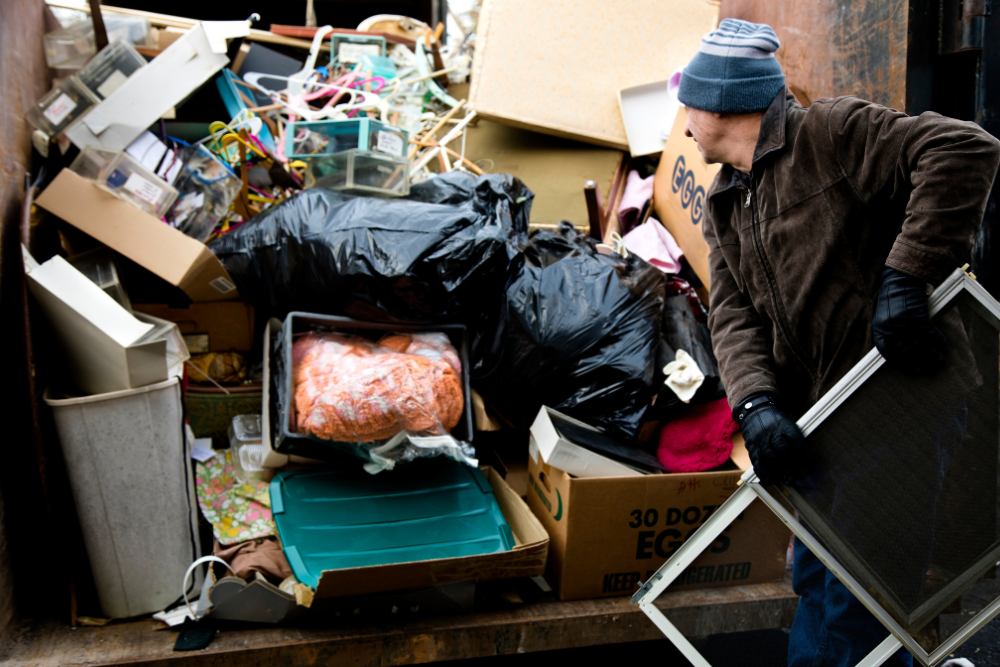Junk removal is not just about clearing clutter; it’s also about making smart choices that influence the environment and your community. When recycling services are integrated into the junk removal process, the outcome goes far beyond a tidier space. Items that might once have been dumped into a landfill are redirected toward second lives, whether as raw materials or repurposed goods. This transition helps conserve resources, reduces waste, and promotes sustainability at every level.
By understanding the impact recycling has on junk removal, individuals and businesses alike can maximize benefits. From lowering disposal costs to reducing carbon footprints, recycling transforms what might have been “junk” into valuable resources. Recycling services ensure that junk removal is not simply a task of hauling away unwanted items but rather a responsible process that carries long-term benefits. It creates opportunities to give back to the environment while streamlining the way we handle everyday waste.
Recycling Extends The Life Of Materials
When you incorporate recycling services into junk removal, materials are given a second chance rather than being discarded forever. Metals, plastics, glass, and paper all retain value even after their first use, and recycling facilities ensure they are processed and reintegrated into production cycles. This process helps reduce the strain on natural resources while giving manufacturers an alternative to sourcing raw materials.
Extending the life of these materials lowers the demand for mining, logging, and other extractive industries that deplete the planet. It also cuts back on the energy needed to create products from scratch, reducing pollution and greenhouse gas emissions. What could have been thrown away becomes part of a loop that benefits both businesses and communities. Recycling within junk removal keeps resources in circulation, proving that what we discard does not have to reach the end of its journey.
Recycling Services Reduce Landfill Dependence
One of the most significant impacts of integrating recycling into junk removal is the decrease in landfill waste. Landfills fill rapidly with items that could easily be repurposed or recycled, leading to environmental issues such as soil contamination, methane release, and water pollution. By removing recyclable items before disposal, junk removal companies can substantially reduce the amount of waste entering these sites.
This reduction not only conserves valuable land space but also minimizes the environmental hazards associated with large-scale dumping. Landfills are not infinite, and relying on them as the primary destination for junk is unsustainable. Recycling services bridge this gap by ensuring materials are diverted from landfills and channeled into productive uses. Through this process, junk removal evolves into an environmentally conscious activity, aligning with broader sustainability goals while protecting local ecosystems from unnecessary harm caused by excess waste accumulation.
Recycling Helps Businesses Save Money
Businesses that partner with recycling services often discover cost-saving benefits tied directly to efficient waste management. By separating recyclables from general junk, companies can cut down on disposal fees, which are typically higher for landfill-bound loads. This makes recycling an economically smart choice in addition to being environmentally responsible.
Recycling also helps organizations reduce their need for new resources. For instance, companies in manufacturing can often reclaim materials from recycled goods, lowering the expense of purchasing raw supplies. Additionally, businesses may gain tax advantages or qualify for green certifications that further enhance financial savings. By embedding recycling into junk removal practices, organizations can align fiscal goals with eco-friendly strategies. This synergy illustrates that sustainable choices don’t have to come at a cost—they often lead to long-term financial gains while showcasing a company’s commitment to environmental responsibility.

Recycling Boosts Community Sustainability
Communities benefit greatly when recycling becomes part of the junk removal process. Instead of filling local landfills or incinerators, recyclable materials are transformed into resources that sustain community development. For example, paper and plastics can be turned into new products, while metals can be reused in construction or infrastructure projects. This cycle ensures that communities thrive on resources that are continuously renewed.
Furthermore, recycling creates local jobs in sorting, processing, and repurposing industries. These roles provide steady employment while fostering growth in sustainable sectors. Communities that embrace recycling within junk removal often find themselves with healthier environments, stronger economies, and greater pride in local efforts. This ripple effect demonstrates how recycling is not just a private action but a public benefit. The more households and businesses that commit to recycling, the stronger and more sustainable their neighborhoods become for future generations.
Recycling Services Conserve Natural Resources
Natural resources are limited, and excessive consumption without recovery strategies puts immense pressure on the planet. Recycling services embedded in junk removal help conserve these resources by reducing the need for raw material extraction. Metals, for instance, can be endlessly recycled without losing quality, while plastics and glass can often be repurposed multiple times.
Every ton of recycled material represents a decrease in mining, logging, or drilling activities. This conservation reduces habitat destruction, water consumption, and energy use tied to resource extraction. By relying on recycled inputs instead of raw ones, industries lessen their environmental impact. Junk removal that prioritizes recycling makes this conservation a practical reality, turning everyday discards into valuable resources. Through these practices, people and businesses play a role in protecting ecosystems and ensuring natural reserves remain available for future generations. The small act of recycling contributes to global preservation.
Recycling Encourages Responsible Consumption
Recycling services in junk removal do more than manage waste—they also reshape how people think about consumption. When individuals see that unwanted items can be reused or repurposed, they become more aware of their purchasing habits. This awareness often leads to more thoughtful choices, encouraging people to buy durable goods and avoid unnecessary waste.
Communities also benefit from this shift in mindset. When people begin to view their possessions as part of a larger cycle rather than disposable objects, it fosters a culture of responsibility. Recycling helps reinforce the idea that every item has value, even at the end of its initial use. By encouraging responsible consumption, recycling not only reduces waste but also inspires long-term changes in behavior.
Recycling Improves Air And Water Quality
Waste disposal methods that rely heavily on landfills and incineration release pollutants into the air and water, contributing to health risks for nearby communities. Recycling reduces this burden by minimizing the volume of junk that ends up in such facilities. Materials redirected through recycling services avoid contributing to harmful emissions or leachates that contaminate the environment.
Air and water quality benefit directly when recyclables are removed from the waste stream. Less burning means fewer toxins are released into the atmosphere, while less landfill waste reduces the chance of groundwater contamination. Cleaner air and water not only improve environmental conditions but also support healthier lifestyles for residents. Integrating recycling into junk removal demonstrates that proper waste management is closely linked to public health.
Recycling Supports Innovation In Product Design
The growth of recycling services has inspired industries to rethink how products are designed, built, and used. Junk removal that incorporates recycling provides a steady stream of recovered materials, encouraging companies to innovate with sustainable alternatives. Designers and manufacturers are increasingly creating products with end-of-life recycling in mind, ensuring they can be easily disassembled and repurposed.
This innovation fosters a circular economy where goods are made to last longer and feed back into the production cycle rather than becoming permanent waste. As more items are collected through junk removal and recycled effectively, businesses are motivated to adopt greener practices. The availability of recycled materials also sparks creativity in producing eco-friendly alternatives, such as recycled textiles or repurposed construction materials.
Recycling Enhances Efficiency In Junk Removal
When recycling is part of junk removal, the process becomes more efficient. Sorting items by type—recyclables, donations, and actual waste—streamlines disposal and ensures that each item is sent to its most appropriate destination. This organization prevents unnecessary mixing of materials, reducing time spent on post-collection processing and lowering overall costs.
Efficiency also benefits clients. With recycling integrated, junk removal services can handle a wide variety of items more quickly and responsibly. Homeowners and businesses save time and effort, while waste management companies reduce their reliance on landfills. This smooth flow of materials ensures that nothing goes to waste when it can be reused, recycled, or donated.
Recycling Creates Long Term Environmental Impact
The effects of recycling services within junk removal are not immediate alone; they accumulate over time. Every item diverted from a landfill and redirected into a recycling facility contributes to long-term sustainability goals. As communities consistently recycle, they build momentum that reduces carbon emissions, conserves resources, and preserves ecosystems for future generations.
The long-term perspective shows that even small actions add up. One household’s recycling efforts may seem minimal, but multiplied across a city or region, they create measurable differences. This enduring impact highlights the power of consistent recycling as part of junk removal. It demonstrates that true environmental change comes from steady, ongoing efforts rather than isolated actions. Recycling services ensure that junk removal remains not just about cleaning up but about building a legacy of care for the planet.
Conclusion
Recycling services transform junk removal into something far more valuable than simple cleanup. By extending the life of materials, conserving natural resources, reducing landfill reliance, and supporting innovation, recycling turns waste into opportunity. The process benefits individuals, businesses, and entire communities by promoting sustainability and efficiency while safeguarding air, water, and natural ecosystems.
For those looking to integrate recycling into their junk removal process, North Bay Junk Removal offers a reliable solution in Santa Rosa, CA. Their team ensures that items are carefully sorted and directed toward recycling or reuse whenever possible. This thoughtful approach means clients can enjoy cleaner spaces while contributing positively to the environment. To learn more or schedule a service, contact North Bay Junk Removal today at 707-478-6817. Choosing their services ensures that your junk removal aligns with sustainability goals, reduces environmental impact, and builds a cleaner future for your community.

